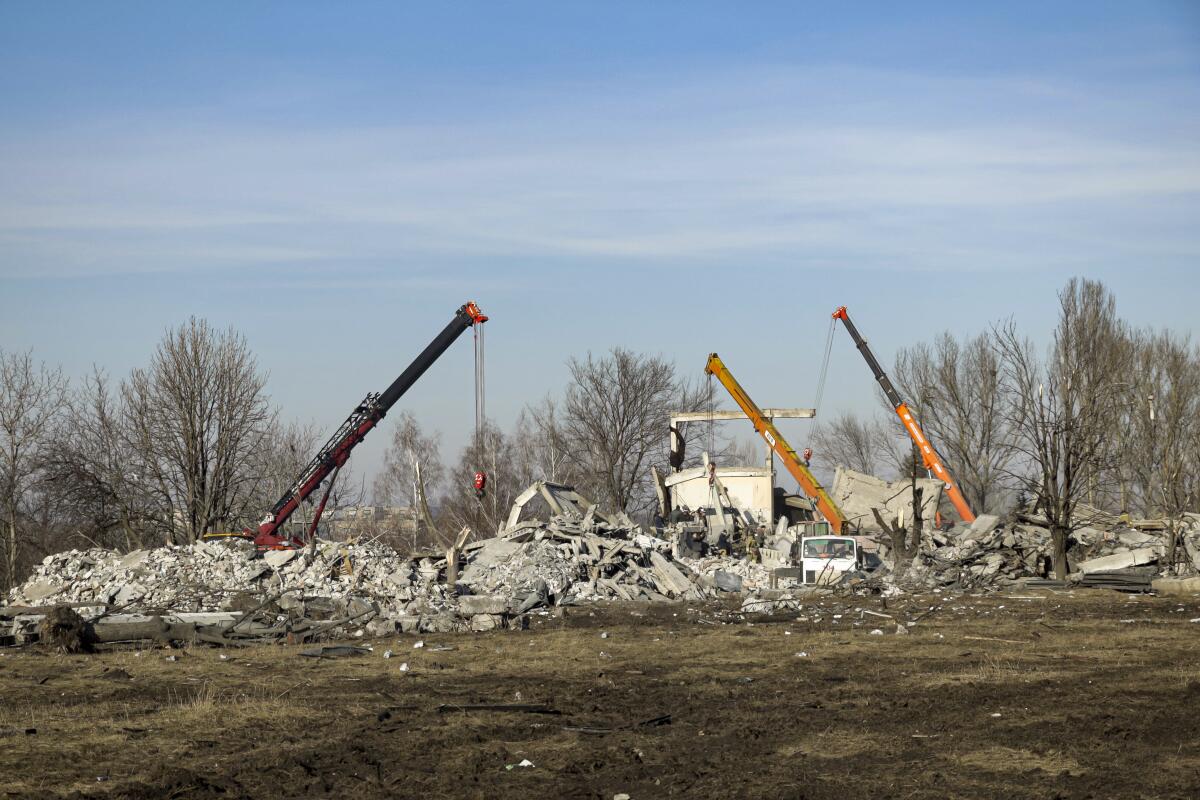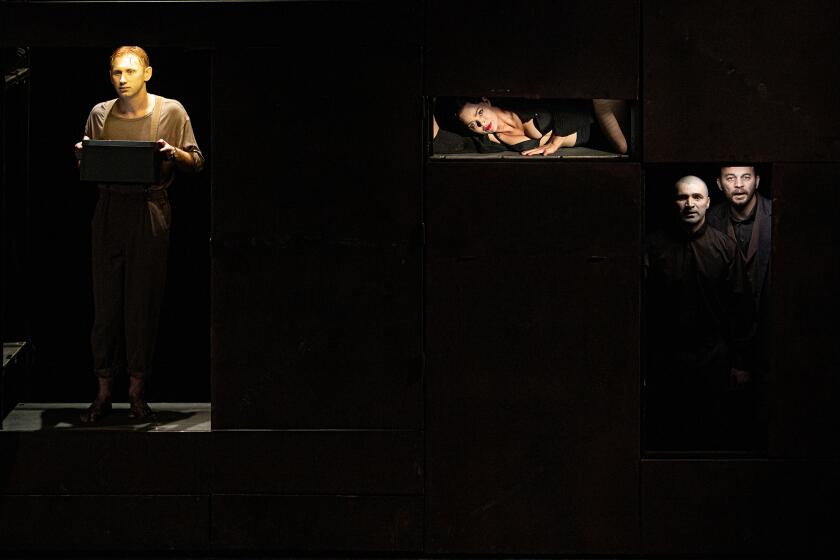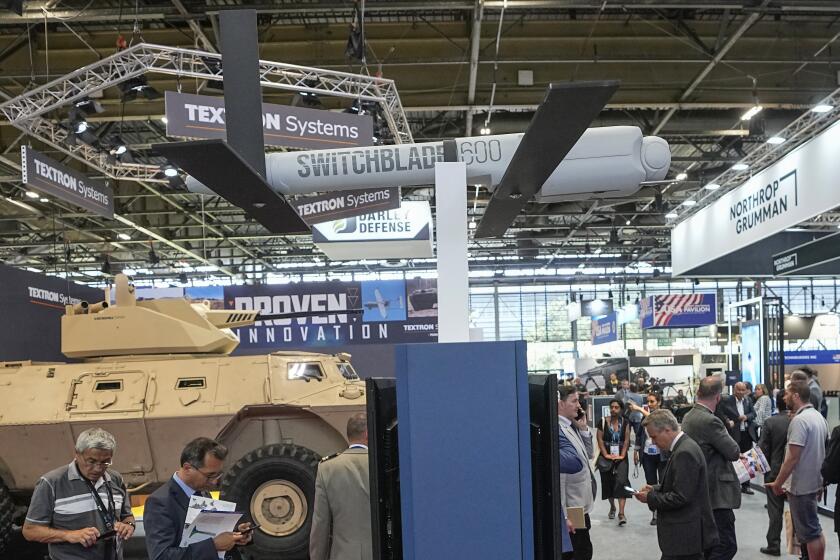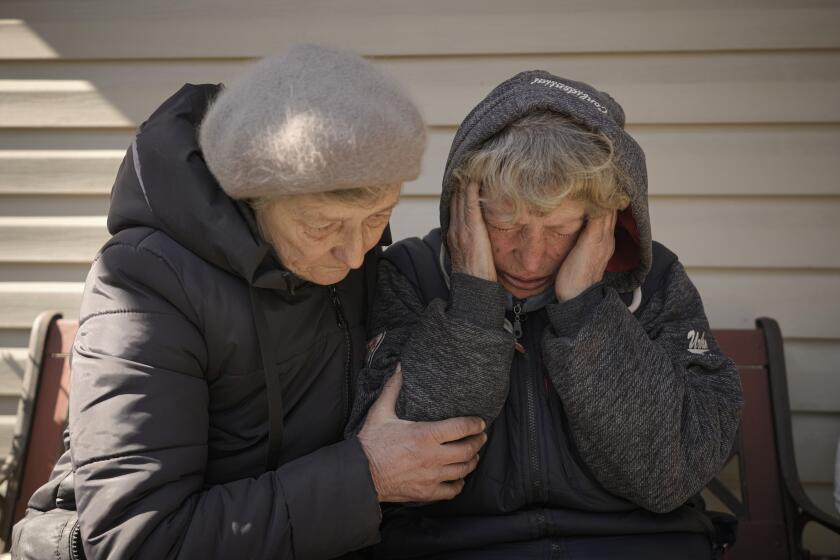Russian military brass, under scrutiny over lethal Ukrainian rocket attack, blames its soldiers using cellphones

- Share via
KYIV, Ukraine — The Russian military’s top brass came under increasing scrutiny Wednesday as more details emerged of how at least 89 Russian soldiers, and possibly many more, were killed in a Ukrainian artillery attack on a single building.
The scene last weekend in the Russian-held eastern Ukrainian town of Makiivka, where the soldiers were temporarily based, appears to have been a recipe for disaster. Hundreds of Russian troops were reportedly clustered in a building close to the front line, well within range of Ukraine’s Western-supplied precision artillery, possibly sitting close to an ammunition storage site, and perhaps unwittingly helping Kyiv’s forces to zero in on them.
It was one of the deadliest single attacks on the Kremlin’s forces since the war began more than 10 months ago and the highest death toll in a single incident acknowledged so far by either side in the conflict.
It wasn’t possible to verify either side’s claims because of the fighting.
Ukraine’s armed forces said the Makiivka strike killed some 400 mobilized Russian soldiers housed in a vocational school building. About 300 more were wounded, Ukrainian officials reported.
The Russian military sought to blame the soldiers themselves for their deaths. Lt. Gen. Sergei Sevryukov said in a statement late Tuesday that their phone signals allowed Kyiv’s forces to “determine the coordinates of the location of military personnel” and launch a strike.
Staging of ‘Caligula’ in the Ukrainian capital is cathartic for audience and cast alike. ‘Resonates in this moment,’ says actor who plays Roman despot.
Emily Ferris, a research fellow on Russia and Eurasia at the Royal United Services Institute in London, told the Associated Press it is “very hard to verify” whether cellphone signaling and geo-
location were to blame for the accurate strike.
She noted that Russian soldiers on active duty are forbidden to use their phones — exactly because there have been so many instances in recent years of intercepted signals being used by enemies for targeting, including by both sides in Russia’s war on Ukraine. The conflict has made extensive use of modern technology.
She also noted that blaming the soldiers was a “helpful narrative” for Moscow as it deflects criticism and steers attention toward the official cellphone ban.
Russian President Vladimir Putin sought to move the conversation along as he took part via video link in a farewell ceremony Wednesday for a frigate equipped with the Russian navy’s new hypersonic missiles.
Putin said the Zircon missiles that the Admiral Gorshkov frigate was carrying were a “unique weapon,” capable of flying at 7,000 mph, or nine times the speed of sound, and with a range of 620 miles. Russia says the missiles can’t be intercepted.
The longer Russia’s invasion of Ukraine lasts, the more likely that drones will be used to identify and attack targets without human aid, experts say.
Away from the battlefields, France said Wednesday that it would send French-made AMX-10 RC light tanks to Ukraine — the first tanks from a Western European country — following an afternoon phone call between French President Emmanuel Macron and Ukrainian President Volodymyr Zelensky.
The French president’s office didn’t say how many tanks would be delivered or when. The North Atlantic Treaty Organization member has given Ukraine antitank and air defense missiles and rocket launchers.
Later Wednesday, President Biden confirmed that the U.S. was considering sending Bradley fighting vehicles to Ukraine. The Bradley is a medium armored combat vehicle that can carry about 10 personnel, or be configured to carry additional ammunition or communications equipment. The Pentagon has already provided Ukraine with more than 2,000 combat vehicles, including 477 mine-resistant vehicles and more than 1,200 Humvees.
Overwhelming evidence shows Russian troops have disregarded international laws governing treatment of civilians and conduct on the battlefield.
The weekend Makiivka strike seemed to be the latest blow to the Kremlin’s military prestige as it struggles to advance the invasion of its neighbor amid a successful Ukrainian counteroffensive.
But Ferris, the analyst, said that “there should be a bit of caution around leaning too heavily on this [attack] as a sign of [the] Russian army’s weakness.”
As details of the strike have trickled out, some observers have zeroed in on military sloppiness as the root cause of so many deaths.
British intelligence officials said Wednesday that Moscow’s “unprofessional” military practices were probably partly to blame for the high casualty rate in Makiivka.
“Given the extent of the damage, there is a realistic possibility that ammunition was being stored near to troop accommodation, which detonated during the strike, creating secondary explosions,” the British Defense Ministry said in a Twitter post.
The ministry said the building struck by Ukrainian missiles was little more than 7½ miles from the front line near Avdiivka, within “one of the most contested areas of the conflict.”
“The Russian military has a record of unsafe ammunition storage from well before the current war, but this incident highlights how unprofessional practices contribute to Russia’s high casualty rate,” the British ministry said.
The Russian Defense Ministry, in a rare admission of losses, initially said the strike killed 63 troops. But as emergency crews sifted through the rubble of the building, the death toll mounted. The regiment’s deputy commander was among the dead.
That stirred renewed criticism in Russia of the way the broader military campaign is being handled.
Military blogger Vladlen Tatarsky accused Russian generals of “demonstrating their own stupidity and misunderstanding of what’s going on [among] the troops, where everyone has cellphones.”
“Moreover, in places where there’s coverage, artillery fire is often adjusted by phone. There are simply no other ways,” Tatarsky wrote in a Telegram post.
Others put the blame on the decision to station hundreds of troops in one place. “The cellphone story is not too convincing,” military blogger Semyon Pegov wrote. “The only remedy is not to house personnel en masse in large buildings. Simply not to house 500 people in one place but spread them across 10 different locations.”
The Institute for the Study of War saw in the incident further evidence that Moscow isn’t properly utilizing the reservists it began calling up in September.
“Systemic failures in Russia’s force generation apparatus continue to plague personnel capabilities to the detriment of Russian operational capacity in Ukraine,” the Washington-based think tank said in a report late Tuesday.
Ferris, of the Royal United Services Institute, said the Makiivka strike shows that the Russian army is more interested in expanding its number of troops than in training them in wartime skills.
“That’s really how Russia conducts a lot of its warfare — by overwhelming the enemy with volume, with people,” she said. “The Kremlin view, unfortunately, is that soldiers’ lives are expendable.”
Start your day right
Sign up for Essential California for the L.A. Times biggest news, features and recommendations in your inbox six days a week.
You may occasionally receive promotional content from the Los Angeles Times.
More to Read
Sign up for Essential California
The most important California stories and recommendations in your inbox every morning.
You may occasionally receive promotional content from the Los Angeles Times.













